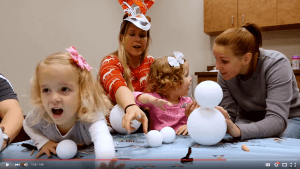[metaslider id=3681]
It’s a scene typical of any preschool: Four pint-sized artists sit at a semi-circular table using Styrofoam balls to recreate Olaf, the snowman from “Frozen.” Their moms and caregivers lend a hand. But this group is special: A dozen NIU students and professors are helping out too.
These toddlers are getting a lot of special attention at NIU’s Family Health, Wellness and Literary Center, thanks to an innovative play group program developed by NIU students. (The program is toddlers to participate. See below for details.)
The interdisciplinary developmental play group is for toddlers between 18 months and 4 years old who have developmental delays or are at-risk, and their parents or caregivers. The primary goal of the two-hour play group is to help toddlers develop in many areas.
“The intent is to help them develop their skills globally. We’re looking at speech and communication, looking at their fine motor and gross mo
tor skills, and also looking at their peer relationships and socialization,” says Christina Odeh, a physical therapy professor at NIU’s Allied Health & Communicative Disorders division.
To accomplish this, a team of nutrition, physical therapy and speech-language pathology graduate students, along with some undergraduates in nutrition, pre-physical therapy and communicative disorder programs, and an occupational therapist, have created structured activities to encourage age-appropriate developmental milestones.
Participating children are assessed on problem-solving skills, how well do they speak and understand speech. Their fine motor skills like using their hands and manipulate things, and gross motor skills like running, getting up from the floor, are also evaluated before they begin the play group. The assessment is for information only–children with developmental delays in all areas can be eligible to participate in the play group.
“We don’t specify what level of delay. We wanted to mix it up so parents could see varying levels (of delay). It helps them to put into perspective what’s going on with their child, and to also network with other parents who have children with special needs,” Odeh says.
In the weekly program, toddlers begin the play group with a welcome circle where they sing songs, read books and greet friends and the students who are working with them. They move on to crafts designed to help develop fine motor skills. Then it’s snack time where the toddlers enjoy healthy snacks, sometimes ‘playing’ with their food to learn fine motor skills.
All aspects of the play group were developed by the graduate students, providing a rich learning experience for them as well as the toddlers and their parents.
Nutrition and dietetics graduate student Emily Mitchell assists in the play group’s snack time. Her experience with students from other disciplines has been important, she says.
“It has given me a taste of the interdisciplinary component of being in the healthcare field is like,” she said, adding: “Working with the physical therapy and speech students is amazing I hadn’t thought about the importance of being able say more being able to say ‘oh yuck,’ or ‘oh yum’… or being able to put a spoon to your mouth, or spread something on a bagel. Bringing those aspects is integral to the success of snack time.”
For many students it is their first time working with pediatric clients outside of a classroom setting, and it has been rewarding. Students were also pleased to witness progress in their young clients.
“You see the amount kids have improved over an eight-week span. I didn’t expect to see such drastic change,” says Aimee Pepple, a physical therapy graduate student.
The parents of the toddlers involved in the play group have given the program positive feedback.
“A parent said this was the first time she was able to take her son to a program she felt comfortable with. Previously he was sitting in a corner, he was spinning, he was not participating. Here he’s engaged, he’s involved and she feels really good about the progress he has made here,” Odeh says.
Parents or caregivers who are interested in registering their child for a spot in the play group should contact Christina Odeh at 630-557-9648 by Feb. 5.
Lori Botterman, NIU Media & Public Relations


